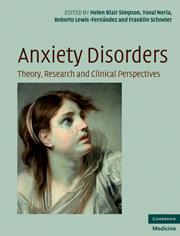Book contents
- Anxiety Disorders
- Dedication
- Anxiety Disorders
- Copyright page
- Contents
- Contributors
- Foreword
- Preface
- 1 Introduction: the need for interdisciplinary approaches
- Section 1 Evolving concepts of anxiety
- Section 2 Challenges in diagnosing pathological anxiety
- Section 3 Understanding the causes of anxiety
- 13 Current status of research in the genetics of anxiety disorders
- 14 Animal models of anxiety disorders: behavioral and genetic approaches
- 15 Role of the cortex in the regulation of anxiety states
- 16 Learned fear and innate anxiety in rodents and their relevance to human anxiety disorders
- 17 Brain systems underlying anxiety disorders: a view from neuroimaging
- 18 Cognitive–behavioral treatment of anxiety disorders: model and current issues
- 19 The stressor criterion A in posttraumatic stress disorder: issues, evidence, and implications
- 20 Attachment, separation, and anxiety disorders
- 21 Non-human primate models in understanding anxiety
- Section 4 Treatment of anxiety: current status and controversial issues
- Index
19 - The stressor criterion A in posttraumatic stress disorder: issues, evidence, and implications
from Section 3 - Understanding the causes of anxiety
Published online by Cambridge University Press: 10 November 2010
- Anxiety Disorders
- Dedication
- Anxiety Disorders
- Copyright page
- Contents
- Contributors
- Foreword
- Preface
- 1 Introduction: the need for interdisciplinary approaches
- Section 1 Evolving concepts of anxiety
- Section 2 Challenges in diagnosing pathological anxiety
- Section 3 Understanding the causes of anxiety
- 13 Current status of research in the genetics of anxiety disorders
- 14 Animal models of anxiety disorders: behavioral and genetic approaches
- 15 Role of the cortex in the regulation of anxiety states
- 16 Learned fear and innate anxiety in rodents and their relevance to human anxiety disorders
- 17 Brain systems underlying anxiety disorders: a view from neuroimaging
- 18 Cognitive–behavioral treatment of anxiety disorders: model and current issues
- 19 The stressor criterion A in posttraumatic stress disorder: issues, evidence, and implications
- 20 Attachment, separation, and anxiety disorders
- 21 Non-human primate models in understanding anxiety
- Section 4 Treatment of anxiety: current status and controversial issues
- Index
Summary
Keywords
- Type
- Chapter
- Information
- Anxiety DisordersTheory, Research and Clinical Perspectives, pp. 216 - 226Publisher: Cambridge University PressPrint publication year: 2010
- 2
- Cited by

